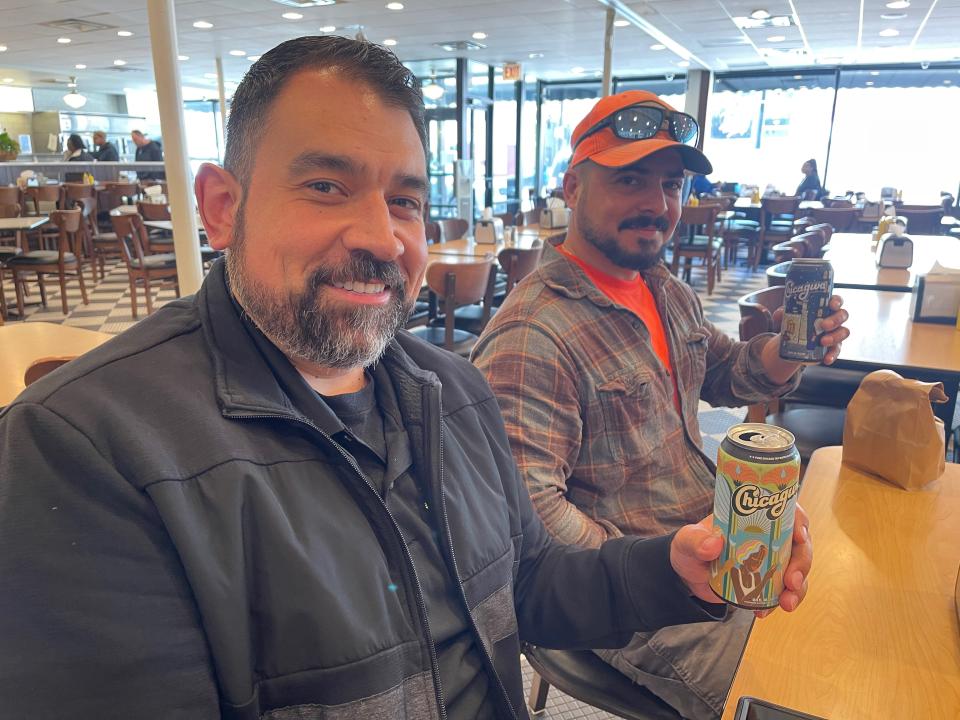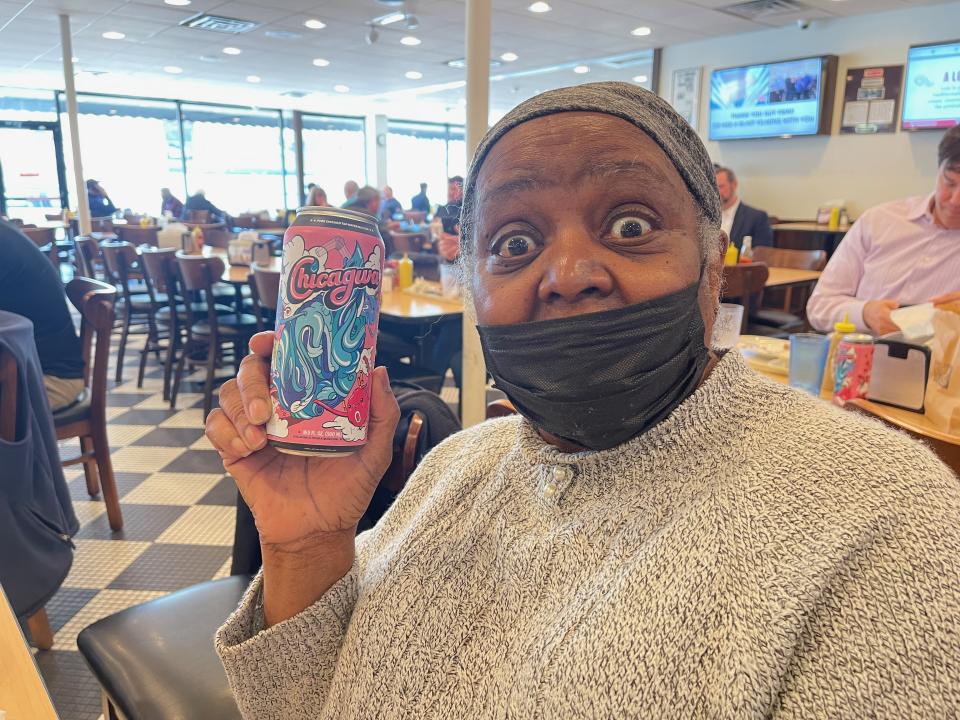'Chicagwa' Should Be A Money-Making Export To Ex-Chicagoans, Snowbirds
- Oops!Something went wrong.Please try again later.
CHICAGO — At Manny's Deli on Wednesday, I scored some Chicagwa — City Hall's new brand of city tap water in cans — to wash down a $21 Reuben sandwich and share a taste of Lake Michigan with strangers.
City officials rolled out Chicagwa in honor of National Drinking Water Week, with plans to give away pint-sized cans at a few local restaurants and summer festivals as a way to highlight the importance of our city's greatest natural resource.

"Nope," carpenter Chris Ziegler said after I offered him a sip. "I'm not drinking tap water in a can. I'll get it from the tap."
His common-sense objection to taking a swig might be a signal that locals aren't the ideal target market for Chicagwa, which Eater.com called a "gimmick." But we'll get to that later.
The carpenter's friendly lunch buddies, Rich Franco and Arturo Hurtado, were nice enough to volunteer to participate in my man-in-the-cafeteria taste test.
"It tastes like it's coming out of a hose when you're 10 years old," Franco said, which, to me, sounded like a compliment.

A few tables over, Matt Struve sniffed and swished Chicagwa — and water straight from Manny's tap — like he was tasting fine wine.
"That's good stuff," the salesman said. "I am unable to discern the difference between the two."
Commercial loan officer Regina Hirn said her slug of Chicagwa was "fresh," with no lead-pipe aftertaste. We laughed.
And Gloria "Ding-Dong" Bell said Chicagwa pairs perfectly with Manny's corned beef.

Pastor Melvin Jackson from suburban South Holland, a self-proclaimed water snob, raved about his first taste of Chicagwa from an ice-cold aluminum can.
"I love water. Good cold water. This is real. It's light," he said. "Like at home. I can't believe I'm drinking [tap water] in a can."
Frankly, neither can I.
The idea to package city tap water has been around for a while.
Former Mayor Richard M. Daley's administration toyed with the idea, but it went nowhere.
In 2020, when high lake levels gobbled up Chicago beaches, University of Chicago law professor M. Todd Henderson penned an opinion column that suggested fixing Illinois' fiscal troubles by selling off Lake Michigan water to corners of America that have too little water — Texas, California and New Mexico, for instance.
Nobody paid attention to what Henderson figured could bring in $244 billion in water revenue, either.
For now, Chicagwa is just a $125,000 local marking campaign celebrating our city's abundance of fresh water, and City Hall doesn't have plans to try to cash in on the new tap water brand.
That's a shame.
The successful export of Chicago tap water in can could turn on a revenue spigot that helps fund the replacement of lead delivery pipes in city neighborhoods — and maybe even quiets Chicagwa critics who panned the $125,000 marking campaign with snarky social media posts and memes.
Guys like WBEZ traffic reporter Mike Pries, who tweeted: "The cans are lead-lined for authenticity."
While locals may not be interested in canned tap water, there are multitudes of ex-Chicagoans who have fled to Arizona, Florida, Texas and California, and surely know what they're missing every time they take a drink from the kitchen tap in their new home state.
I can see it now: Retired Chicago cops in Florida and snowbirds in Arizona paying a premium for cans of Chicagowa — instead of bottles of water imported from a mountain spring or an exotic island aquifer — just to get that straight-from-the-hose taste of their youth.
Mark Konkol, recipient of the 2011 Pulitzer Prize for local reporting, wrote and produced the Peabody Award-winning series "Time: The Kalief Browder Story." He was a producer, writer and narrator for the "Chicagoland" docuseries on CNN and a consulting producer on the Showtime documentary "16 Shots.
Read More From Mark Konkol:
Despite Violence 'Public Health Crisis,' Pritzker Breaks $50M Promise?
My Dog-Walking, Allegedly Armed Neighbor Got Shot By Cops Near Park
Did Magazine Get Used By Davis Gates To Influence CTU Election?
Not Enough Cash Back To Buy Pritzker's Election-Year Budget Gimmick
Pritzker Finally Ditches 'Unreliable' COVID Test Positivity Rate
'Chicagwa' Should Be A Money-Making Export To Ex-Chicagoans, Snowbirds originally appeared on the Chicago Patch

